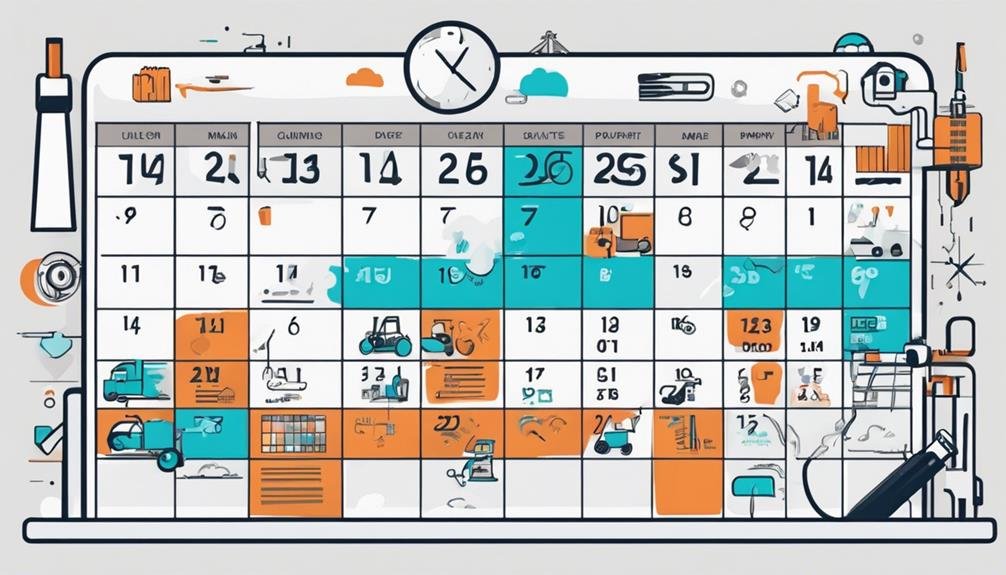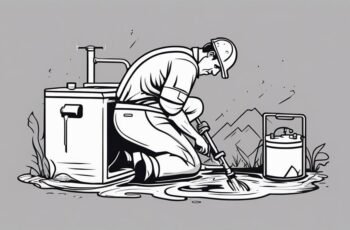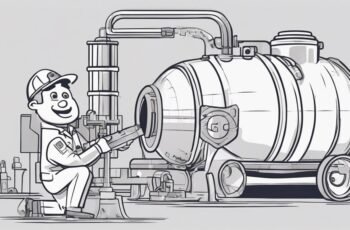Ensuring the optimal pumping schedule for 2024 is crucial for the successful operation of your systems. With a myriad of factors influencing the frequency of pumping, it's imperative to rely on expert recommendations to maximize efficiency.
By following the right schedule, you can prevent costly breakdowns, enhance performance, and extend the lifespan of your equipment. Stay tuned to discover the key insights and strategies that will help you navigate through the complexities of pumping schedules in the upcoming year.
Key Takeaways
- Establish regular pumping every 2-3 years for optimal system maintenance.
- Tailor pumping frequency to specific system needs for efficiency.
- Prevent system overload, reduce malfunctions, and extend system lifespan.
- Invest in optimal functioning to avoid disruptions and premature replacements.
Importance of Regular Pumping

Why is regular pumping essential for optimal efficiency in water management systems?
Preventive maintenance through regular pumping plays a crucial role in ensuring the longevity and efficiency of water management systems. By adhering to a consistent pumping schedule, you can prevent potential issues such as clogs, system overloads, and pump failures. This proactive approach not only maintains the performance of the system but also leads to long term savings by reducing the need for costly repairs and replacements.
Regular pumping helps in maintaining the flow rate and pressure within the system, ensuring that water is effectively transported to its intended destination. It also aids in preventing sediment buildup and blockages that can hinder the system's operation. By incorporating regular pumping as part of your maintenance routine, you're investing in the optimal functioning of your water management system while avoiding disruptions that may arise from neglecting this essential task.
Factors Influencing Pumping Frequency
To determine the optimal pumping frequency, various factors such as system capacity, usage patterns, and environmental conditions must be carefully evaluated. These influential variables play a crucial role in establishing the frequency determinants for an efficient pumping schedule.
System capacity refers to the tank or septic system's size and its ability to hold wastewater. Larger capacities may require less frequent pumping compared to smaller systems. Usage patterns, including the number of occupants in a household or the type of activities conducted, impact the rate at which the system fills up.
Environmental conditions such as soil permeability, groundwater levels, and weather patterns also affect pumping frequency. For instance, heavy rainfall can increase the water entering the system, necessitating more frequent pumping.
Recommended Pumping Schedule

Considering the factors influencing pumping frequency outlined previously, the recommended pumping schedule can be tailored to optimize system efficiency and longevity. To ensure pumping efficiency and minimize maintenance requirements, it's advisable to establish regular pumping intervals based on the specific needs of the system.
For most systems, a pumping schedule every 2-3 years is a good starting point. However, systems experiencing higher usage or in environments prone to more debris may benefit from more frequent maintenance, such as semi-annual or annual pumping. This tailored approach helps prevent system overload, reduces the risk of malfunctions, and extends the overall lifespan of the pumping system.
Benefits of Timely Pumping
Timely pumping enhances system efficiency and prolongs equipment lifespan by minimizing stress on components. When pumps operate optimally, they deliver the required flow rates with reduced energy consumption, leading to increased efficiency. By adhering to a proactive pumping schedule, you can prevent potential breakdowns and costly repairs, thereby achieving significant cost savings over time.
Efficiency gains from timely pumping are twofold: first, by ensuring that the pump operates at its peak performance levels, and second, by maintaining the overall system efficiency. Regular maintenance and timely pumping schedules help in identifying and rectifying issues before they escalate, resulting in smooth operations and reduced downtime.
Furthermore, prolonging the equipment lifespan through timely pumping practices translates to long-term cost savings. By reducing wear and tear on components, you minimize the need for premature replacements, leading to reduced maintenance costs and increased operational longevity. Embracing timely pumping not only benefits your system's efficiency but also contributes to substantial cost savings in the long run.
Frequently Asked Questions
Are There Any Specific Regulations or Guidelines for Pumping Schedules That Homeowners Should Be Aware of for 2024?
For 2024, regulations and guidelines regarding pumping schedules are essential for compliance. Stay informed to optimize maintenance with modern technology. Ensure efficient operation by adhering to specific requirements tailored to your system.
How Can Homeowners Determine if Their Septic System Needs Pumping Before the Recommended Schedule?
To determine if your septic system needs pumping before the recommended schedule, watch for signs like slow drains or foul odors. Regular maintenance tips include monitoring water usage, avoiding flushing harmful substances, and scheduling professional inspections every 3-5 years.
Are There Any New Technologies or Methods Available in 2024 That Can Help Optimize Pumping Schedules?
In 2024, you can leverage new technologies like smart sensors and predictive analytics to optimize your septic system's pumping schedule efficiently. Stay ahead of issues with real-time data, ensuring your system functions smoothly.
What Impact Does the Size of a Household Have on the Recommended Pumping Frequency for Septic Systems?
Household size directly influences the pumping frequency of septic systems. Larger households typically require more frequent pumping to maintain optimal function. Regular maintenance, aided by technological innovations, can help extend the lifespan of the system.
How Can Extreme Weather Conditions or Natural Disasters Affect the Pumping Schedule for Septic Systems in 2024?
How do climate change and extreme weather impact septic system maintenance in 2024? Adaptation strategies include monitoring tank levels more frequently, having emergency response plans, and utilizing innovative technologies to ensure your system functions optimally during challenging conditions.
Conclusion
Based on expert recommendations, it's crucial to adhere to an optimal pumping schedule for 2024. Regular pumping is essential to maintain the health and efficiency of your system.
By following the recommended pumping frequency, you can prevent costly repairs and ensure smooth operation. Remember, a well-maintained septic system is like a well-oiled machine – it runs smoothly and efficiently, giving you peace of mind.
Stay on top of your pumping schedule for a worry-free future.

